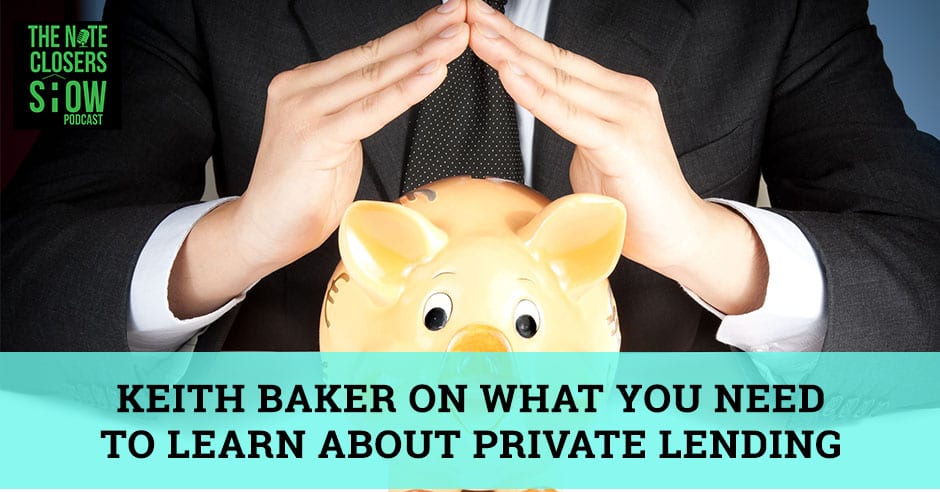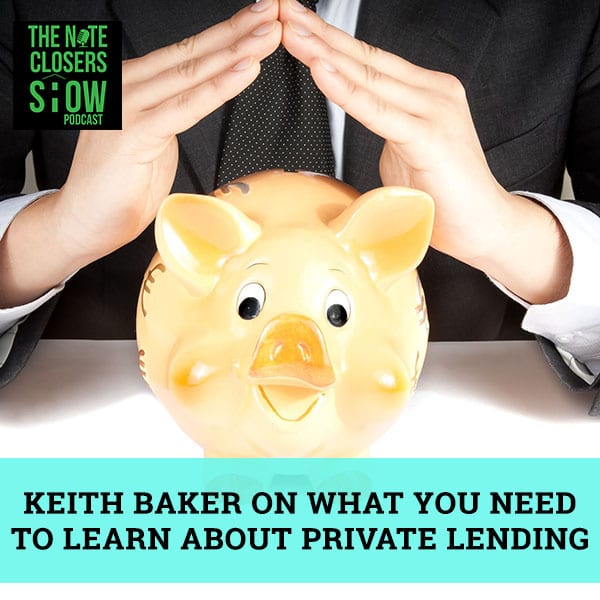
—
Listen to the podcast here
Keith Baker on What You Need To Learn About Private Lending
We’re jacked up to have a very special guest on the show. Our buddy, Keith Baker, from the Private Lender Podcast is joining us all the way from Houston, Texas. Keith, what’s going on?
Thanks for having me on. I’m doing well.
First of all, for those that don’t know who you are, share with our note nation who Keith Baker is and what the Private Lender Podcast is all about.
I’m a proverbial underachiever, slacker, drop out and insisted on doing things the hard way. I went and got myself a corporate job that I liked and was very comfortable. I didn’t want to leave, I didn’t want to pursue it. I had a little piece of that business so I was not looking to quit. I love real estate. I used to be a construction manager for a home builder. I’ve always enjoyed dealing with properties, land and sometimes people. On occasion, I like dealing with people. I found that private lending was a perfect vehicle for me to stay in the real estate investing game and be involved, still be able to network, but keep the status quo, keep the W2 coming in, keep the wife happy and it started snowballing.
One day I was on vacation with the family and I realized if you want to be a wholesaler or a flipper or whatever, there are all these tons of education out there but no one’s out there telling people how to be a private lender except people who want their money which is good. Most of the people I know have integrity and they’re above board like yourself and that was serious. That wasn’t a joke there. I’ve noticed a lot of people get some advice that I wouldn’t agree with necessarily. I decided to start the podcast to put it out there, to tell the story of how I became a private lender, the mistakes that I’ve made, the mistakes I continue to make and which ones I refuse to make again in the future. That’s the whole drive behind the podcast is to teach it and put the content out there to let people know, “This is a great way to invest. You don’t need Wall Street. You can stay away from your Gordon Gekkos, you don’t need banks.” If you’ve got your money in a CD or money market, you’re not even making inflation right now. Why not do a little bit of risk mitigation and put that money into an asset that’s backed by real estate or an investment that’s backed by a tangible asset and go from there?
It’s been slow and going, but it’s been a success here little by little. More and more people are coming out of the woodwork, “I had no idea you could do this.” It’s been trying to get the word out there, “Yes, you can do this.” Now, my ultimate goal, like Pinky and the Brain, I don’t want to take over the world, but I want to relegate banks to only doing direct deposits and using for free, what they call it, notaries. That’s all I want banks to do. I figured why not keep the investment in the money between the investors and build our own little economy so that if you’ve got a deal, I’ve got the money, we can knock it out. You make your money, I make mine, and we move onto the next one. That’s the idea behind the podcast.

Private Lending: We tend to complicate things much as humans.
I always like to know when we have people who have podcast what’s their inspiration, what’s their motivation. That’s good you give people a little bit of insight to what your show’s about. What would you say is the biggest, “I did not know,” that you’ve gotten from your listeners and your audience?
I can become a lender to real estate investors. That’s probably the biggest one. They didn’t know that it’s a business loan between two individuals, but as long as that person is not living in the house, it’s very simple. There’s very little, if at all, regulation behind it. As long as the documents are legal in whatever state that you’re doing business in, then there’s very little barrier of entry except for the knowledge or the experience that you can do it and how to do it. That would be the biggest one. I didn’t know you could do that. The other one is people didn’t realize that they can take an old 401(k), put it into a self-directed IRA, do almost whatever they want with it and the IRS allows it. That’s probably the second biggest one. I’m a huge fan of self-directed IRAs and I do the bulk of my lending out of mine and my wife’s self-directed IRAs.
We ran into each other at the Quest IRA event.
We do it quite a bit. I can’t get away from you. It seems that anytime there’s a Quest event, I know Scott is going to be there. It’s always a good time. You guys should have been at the Quest Expo before we even got going, we were cutting up and having a blast. It was a great event. It was good to see you there. It was good to joke around a bit on stage. A lot of people don’t realize the power that’s there at Quest and the self-directed IRA custodians. It’s all right there at their fingertips if they just put a little bit of effort into education that the world is open to endless possibilities.
There are many different options out there. Private lending has been around a lot longer than banking assets. In the paper game of lending, if someone, whether they’re the ones receiving payments, which is what you want to be as a private lender or you’re on the opposite side where you’re making payments out. You had Ron LeGrand too in your podcast. What was your biggest a-ha or take away from Mr. LeGrand when it comes to private lending?
He was able to condense it down. One thing I like about Ron, I’m not a student of Ron’s, but he makes you feel like it’s that easy. I feel dumb. We tend to complicate things much as humans. Ron was like, “Here you go, you borrow this, you lend that and here’s the difference.” Whatever the deal may be it’s easy, simple, don’t complicate it, keep everything legal, get your documents in order. I wouldn’t say much of an a-ha. It was refreshing to hear someone of his stature saying, “You can walk and chew gum at the same time. It’s not hard.”
Ron has been around for 40 plus years, probably one of the most well-known real estate educators on getting started, fixing, flipping and wholesaling. I’ve got a chance to spend a lot of time around him and Travis. It’s not an endorsement forum. It was simply saying, “Here’s a lot of great information.” His book on options and wholesale is one of the best books I’ve ever read. It helped me to rock and rolling as a new investor. He’s always a big advocate of self-directed IRAs and at Quest, he’s always a regular speaker at what they’re doing and stuff like that. He can be a little ornery sometimes. It makes everybody feel stupid a lot of times.
I was happy I got him. That was my first whale of an interview on the podcast. I thought I had some pretty big names, but I got Ron LeGrand to agree to it. I’m not going to lie, I have done enough of these things that I don’t get nervous. When I heard Ron LeGrand’s voice, I was like, “Here we go, don’t mess it up because this guy has taught all the teachers out there, all the mentors and gurus.” It was fun though. I’m glad. I didn’t even edit it. I put it together and put it out there as raw and as real as possible. If you hear me fumbling over some things, it’s good old nerves.
Who else were some of your bigger guests that you’ve had on?
I’ve had Mitch Stephen. I’m a big fan of Mitch Stephen. My business partner is a student of his. We’ve done some owner finance. The Renovating Riches Podcast fellows were a lot of fun. I had Steven Kaufman from Zeus Mortgage. He’s a heavy hitter in Houston and I was honored that he came on. He was named one of the best CEOs in Houston, a friend of the company at Zeus Mortgage that he works for at Zeus Trust. Larry Goins is going to be coming on, Eddie Speed, some of the bigger names. Then some local guys, heavy hitters like Ray Sasser, Landon Rothstein, my partner and Nate Hare from Quest IRA came on as well. They’re putting the word out there that this is not only legal but doable and easy. I try to alternate between guests and content. I’ve been pleased with it so far and we’re getting a good response.
What’s your favorite facet of private lending? What’s one of the favorite things that you get tickled when you think about?
The passivity of it all. I’m not lazy but once I make my decision to do the loan, to make it, I don’t want to do much behind it. I want one email a month to see where that money is, it’s in the bank account or the Quest IRA account and I’m done. I love that aspect of it. Like yourself, I travel quite a bit. I’m not going to go hustle and go yell at the drywall guy on a flip. I can loan it to an investor and say, “You’re going to take care of all that and I’m going to take my interest in my points or whatever the arrangement we have and I’m going to sit back.” Am I going to get rich overnight? Am I going to be like Tai Lopez and have books around my Ferrari in my garage or my Lambo? No, but slow and steady wins the race. I’m going to be the turtle here and little by little and it will open up to joint ventures.

Private Lending: The beauty of private money is if you and I are doing a deal, it’s whatever we agree upon.
With note investing, we are using private money all the time. We’re not going out and getting a loan from a traditional bank. A lot of times we’ll split it up into a flat interest rate we’re paying off for private investors or to an equity split with a lot of things there for you. You talked about points and interest rates. Let’s talk about the differences between private lending and a bank loan for the first part, why don’t we do that?
I like to give an analogy where your banks are your lowest cost of money. You can go and get a 4% or 5% interest rate on a mortgage. I’m not sure what personal loans are, maybe around 6% or home equity lines of credit. They’re going to be your lowest cost of money, but they’re going to take the longest to get to it. It might take 40 days to get that loan. On the other side of that spectrum, you have the hard money lenders who are going to be the most expensive, but they’re going to close within a week. They’re going to be fast. Oftentimes, they’re investors and sometimes they’re predators like they’re looking at a deal and they want you to mess up, so they can take the property.
A good hard money lender will help you through the process and help you be successful but they’re very expensive and they’re very fast. Private lenders sit right in between all that. You want the speed of the hard money lender, but you want to fall somewhere in between the costs because you certainly don’t want to take as long as the conventional banks. In Texas, where I do most of my lending, usury is 18%. I will take 18% if I can get it all day every day, but the reality is most people are going to walk past me if I’m offering 18%. I like to sit somewhere depending on the project, minimum 8%, and those are friend prices, brother Danny prices, all the way up to depending on the project, 13% or 14%, no points. It depends on the project whether it’s a flip, it behooves me to offer some point and the point is 1% of the loan amount. For simple math, if I’m loaning somebody $100,000 and I’m going to charge them two points for the loan, that means at closing, they’re going to give me $2,000, which by law I believe goes against my interest, it goes against my usury.
Let’s say I do a 10% loan for six months and I charge two and a half points. I get $2,500 at closing and then I would get $5,000 over the course of that loan and interest. That’s the difference between how I look at points and interest rates and where as a private lender, we can sit because banks have deregulated. There are laws and there’s Sarbanes-Oxley, there’s the Dodd-Frank. Keep it in between the hard money, the banks and have speed and maneuverability.
The beauty of private money is if you and I are doing a deal, it’s whatever we agree upon. You might want to give me 18% but there’s a concession on the other end. It’s all negotiable, everything is negotiable. That’s why I like private lending and where I tell people to stay in that. Longer term, I’ll go down to 8% on an owner finance deal, like one of Mitch Stephen’s students, but I’m going to get some points up front. The beauty of that is, let’s say I put my money to work for three years. I’m only getting 8% but I don’t have to go work it. I know it’s out there working for me. I’m not having to hustle and finding people like yourself or the Note Closers Show are going to REIAs to try to find other investments. I’ll be willing to sit and take a smaller interest rate if I don’t have to work the money.
For those who don’t know, what’s a point?
The point is 1% of the loan amount. If it’s a $50,000 loan, 1% of that is $500, that would be due at closing. I would charge that. Think of it as an interest that’s paid upfront. A point is interest that’s going to be paid upfront versus monthly or whatever the payment plan of the loan is going to be. In a case where a lot of hard money lenders charge 13% and four points because they’re making their money on the points. They want their $4,000 upfront, they’ve made their money. Then their private lender where they’re borrowing the money from is going to maybe 10% or 8% and they’ll take the spread.
A lot of hard money lenders make their money by getting the points upfront or 1% of the loan value at the front. I’ve also done points from the back end to help people out. Let’s say they’re getting a little crunched for cash. Depending on the situation, I’ve taken a point on the backside when the loan closes out when I paid it off as well. It’s a nice little tool that we lenders can use. We could also weed people out with it if you don’t want to make the loan. I always tell the people I don’t like the project, but you could always say, “I want five points,” and then the phone will go silent and you won’t get any loans. You won’t be lending anything. It’s part of the negotiation process and a way to get some ancillary money.
We have a question, “Are you still responsible for usuring in Texas when you don’t do owner-occupied loans?” Usually, a commercial loan is not falling on Dodd-Frank or CFPB. I know Memphis falls in both, but mostly it falls into commercial.
My understanding is in Texas, 18% and there’s no police. You and I could do a loan at 25%. The problem with the usury is, let’s say I loaned you money at 25%, we have a falling out and you take it to court. The judge says this interest rate is usurious. He throws out, he nullifies the contract that you and I have between us. Now you don’t owe me any money. Even if it is a non-owner occupant, I keep everything at 18% or below a little bit of cushion. I learned that from a good friend at Quest, just to be on the safe side and stay on the good side of the law. That’s why a lot of credit cards are in North Dakota because North Dakota usury is in about 25%. They’re domiciled in North Dakota, so they can discharge ungodly amounts of interest on credit cards and unsecured debt. My understanding of the law is you’ve got to hold under the usury and it’s a good practice to do so.

Private Lending: If there’s a lot of equity behind you, you’re in a good value.
I see a lot of hard money lenders out there that are reaching out to private lenders. You’re giving private lenders to give them the money at lower interest rates, 8%, 10%, 12% and lending that money out at 12% to 15%. They’re making a difference in the interest rate on a monthly basis, but they’re also charging the points that’s where they’re making their money. A lot of the hard money lenders are doing short-term loans, six months, twelve months loans if you’ve got to renew for another six months or you’re paying some more points to renew, two to three points to renew. I don’t want to give away anything but are all private lenders looking for 12% on their money?
You’d be surprised. It depends on several factors. It boils down to their risk tolerance. You certainly have people that say, “I can get 18%,” and they see usury. They think they can go get 18% and they want to get as much money as they can. Other lenders are like, “I don’t want a fuss with this. I’m old. You do the work. Give me the first position lien on the property,” which is very key and something I like to espouse and to teach. Always get the first position if you’re in a new state, far away from second positions until you get your feet wet. What that means is after the federal and county government, the local taxing authorities and IRS have their say, you’re the next in line with that lien or you’re in the foreclosure if they don’t pay. The whole key to private lending is getting that first position lien to secure your investment.
If you’re going to be lending around me, I like to be in a first lien position. There are lenders out there though, who are lending on second lien positions or mezzanine financing as they call it, where they’re helping people with a budget. They get a traditional loan for the first and they’re coming in with a private second to help with the repair cost because they know that the appraised value, once it’s repaired is going to be a lot higher and they can go from there.
That’s definitely a lot riskier and it’s a lot more sophisticated. I don’t like it on single-family myself. I have done on a single-family and I’ve been able to live to tell you not to do it. Fortunately, it worked out for me but it was touch and go. I was sweating a little bit there. I’ve done some mezzanine and small commercial and I was more comfortable with the project. Whether or not I was, I felt more secure with the project and the team of investors that were putting everything together where the owner financing was not an option. The seller wants an out cash, so they went and got with the bank money. Then we came back in, put some rehab funds to get the curb appeal up and going, and then the rents started coming in. It’s a little different with commercial but with a single-family, stay away from the second position. I tell people to stay away but I’m guilty, I’ve done it here and there.
If there’s a lot of equity behind you, you’re in a good value. That’s just an example. If you can make sure that the first is performing, that’s a big thing too. Never invest the second behind a nonperforming first.
Know who owns that first and have an agreement with them in writing. If they default on you, allow me the right to step in and take over their positions so that I can go ahead and foreclose. I’m going to take over the note that they have with the first lien holder rather than, “Lien holder number one, I want to cash out. Lien holder number two, sorry, there’s nothing left for you.” If they’ll allow that and agree to it in writing notarized, I’ll definitely consider it. If you’re sitting out there thinking, “Maybe I want to go open a Quest IRA account,” anytime you hear second, just run for a little while. For a year, run away from second position liens. That would be my advice.
There are a lot of people who look at the seconds game, but they’re not seeing a lot of the seconds after for the most part. A lot has been created over the last ten years on the traditional financing side. It has been mostly first, but it was ten years ago where for every five to ten first grade, you have one or two seconds, but you don’t see a lot of that stuff now. Most of the guys want to be in a first lien position. If they have to let in as mezzanine, they’re likely to pay off that underlying first to make it a larger first lien.
We do see that. Let me go ahead and take over the whole thing and have the one position on it. I know people like you have that kind of money. I myself don’t. I tend not to do that. The beauty of private lending is you can get as creative as you want or you can be as steadfast and as conservative as you want. You can have success with both tactics. It depends on you as the lender and the investor and what they can both live with.
What are some tips you would give to people talking to new private lenders?
Don’t ask them for money right off the bat. I put the sign up or I wear my shirt and automatically people think, “What are my rates? What do I charge? What’s the project? Who are you? What have you done?” Don’t ask for money right away. Build a relationship. Start talking to them. Talk about their kids. Talk about whatever they’re to pay if it’s bad. Just get going with them. Talk with them, build a rapport. Let them know about your business. If you’re an investor, this is what I do. If you have not done any loans, I haven’t done any projects, no notes, no flips, nothing, don’t ask a private lender, go to a hard money lender. Get a reputation, get a repertoire, get a portfolio of the work that you are capable of doing. That way you can go to a private lender and show them, “This is in my wheelhouse. I flipped eight houses between ARV or after repaired value between 130 and 160. I’m very comfortable with this. Here are my crews.” Lay everything out. Just don’t come up to people and start asking for money. I’ve only done it a couple of times at a bar. I walked up to a chic and started flirting. It doesn’t always happen. Sometimes it does. That might not be a good thing.
Real estate is not so much about properties and land. It’s about people and private lenders are no different. Before I lend to somebody, I want to know who they are. It goes back to something that Gary Vaynerchuk talks about when you hire, “Your skills can be taught but culture and drive can’t.” As a real estate investor, you want to find a private lender that you jive with, you have some similar values. You can make that private lender comfortable knowing if something goes wrong, that investor’s going to cut their throat to make the private lender whole. If somebody does that with my money, I will lend to them again and again because that investor has a sense of duty and care to my money and someone who cares for my money as much as I do is going to be able to get it time and time again.
You’re going to rinse and repeat and take care of them again and again as long as you take care of your investor in a proper fashion.
I’m going to go a little off color here, but it’s true. It’s an analogy that’s true. The young bull and the old bull are sitting up on top of the hill and have all these cows in the valley. The young bull looks to the old bull and goes, “Let’s run down there and go have fun with a couple of those cows.” The old bull laughed at him and goes, “Why don’t we walk down there and have fun with all of them?” That’s pretty much the same thing. Take care of them one at a time and you’re going to get repeat business. People are going to come to you. If you’re a lender and you say, “I can close within a week and you close within seven days, time after time, you’re going to have a reputation of being someone who stands up to their word and provides what they say they’re going to say and what they’re going to do. The same thing on the investment side. All investors are going to run into trouble, but if you take care of your lender, that money will be there the next time for the next deal. You don’t have to go shopping around for somebody. That’s the philosophy I like to espouse.

Private Lending: Excuses are like butt holes, everyone’s got one unless there were some extenuating circumstances.
What would you recommend for somebody who flakes on you and then comes back to you as a lender?
As a lender who flakes out, who doesn’t close, you just move on. Excuses are like butt holes, everyone’s got one unless there were some extenuating circumstances. Things happen, banks mess up, lawyers mess up, IRA custodians, not Quest but other ones take forever. They can lose deals. Things do happen. I would look at it on a case by case basis. Unless there’s a cancer diagnosis or something major, then as a borrower, I would take that person off my lender list and move on and try to find someone who can perform as they promise.
A lot of people, especially brand-new people, they start talking to their friends and family. They switch up $5,000 or $10,000 or $15,000 and they get excited. You can’t do a lot with those small amounts. You don’t want to pool them together because that’s illegal, the pooled funds.
It depends on how you do it but as the investor, you’re absolutely correct.
The thing is to keep out and keep talking to people. Let’s talk about one of the best ways that you found or as you talk to people the best way to find private investors out there.
Those are REIA meetings, Meetups, Quest IRA events. Every major MSA is going to have something going on pretty much every night of the week to where you can go find private lenders. Start talking to them first. Don’t ask for money right away, a couple of times, it doesn’t take long. One way to get a lender interested into you is to be interested in that lender. Talk to that lender, find out what they’re doing, then it’s reciprocated. You close that gap pretty quickly on, “Maybe we can do something here,” and then take them to coffee. Talk to them, shake their hand, look them in the eye, give them a text or a call or two, and then start working that way towards borrowing money.
It’s all about building rapport there. The first question I’ve always found too is that investors aren’t worried about their interest rate is. It’s not the first thing, it’s whether they like you and trust you.
That’s the most important, especially on what we do with the private lending is know, like and trust, KLT.
If you don’t have rapport, people won’t like you. This is the big thing about real estate investing, if you don’t like somebody, don’t work with them.
You don’t have to. If that wholesaler charges too much, then get off his list. Unsubscribe, it’s easy. It’s your choice.
If you get a pain in the ass investor, PITA, just walk away. Just say, “I don’t think we’re a fit,” and have the whole next mentality.
One of the biggest mistakes people make when it comes to investing and lending is they don’t say no. For whatever reason, they’re afraid. Maybe they want the deal so bad or they get emotionally involved with the structure of a deal or something and they won’t say no when a lot of times if you cut that out. Your life gets so much easier and you’re open and receptive to the next deal. Have the ability to say no. The lawyer is always telling me not to say this but go with your gut. If everything looks good on paper, but you think the guy’s a charlatan, go with your gut.
Let’s say you feel good about the person. Let’s talk about some of the things as far as a deal proof. If you go to the REIA club and you see somebody get to the front of the room and they talk about a deal, but they don’t give numbers, they don’t get specifics to attract the private investors. What makes the deal attractive for somebody to fund that deal?
It’s all steak and no sizzle. I wouldn’t harp too much on the deal. Show them the basics of the deal, show them some basic numbers, pull up a comp or two. You don’t have to have a full market analysis or a broker price opinion. Bring up a couple of things to say, “This justifies my numbers. This justifies where we are. I can give you more information.” Talk about your process. There are three things in private lending. First, I want to look at the person before I even look at the property. Then I want to look at their process. Is this guy a landlord who’s wanting to start to flip? Has this guy done 30 flips? What is his normal process? What is he doing or she doing on this project? If those two tests surpass, then I’ll look at the property and the deal and say, “Your rehab budget is always under.” You can comment on those things and analyze it and move on forward, but just showing up with somebody, showing up at REIA, you’ve got a deal a minute. Just say, “This is who I am and this is what I do. This is why I deserve to be up here. Here’s the deal and this is how the numbers are supported.” That handful of things and then let the cards fall where they may go. Have your conversations afterward over coffee or donuts and cultivate the relationship that way.
If you’re brand-new too, I would rely definitely on the process and then your vendors. You don’t want to be the guy who’s working on a 60-hour week job and say, “I’m going to go through this property effectively” because we know that’s not going to happen. Who are your vendors? What’s their experience? One of the things we focused on with our Note Mastermind group is like if you’re brand-new, you’re not alone. Share the fact that you’ve got 80 people that you hang out with on a regular basis. They’re there to support, to back you up, and help you with things, plus your attorneys, your servicers, that kind of stuff.
That’s a good point because that person’s team is part of them and their process. Are they going to Craigslist for tile contractors or roofers? I always tell people who are starting off, don’t loan to a whale in your market. For example, Ray Sasser who I had on the show, we call him the encyclopedia of Houston real estate because he’s been doing it since the early ‘80s. He takes a very engineering mindset to everything. I told people, “Go loan Ray your money.” You’re not going to go make 14% because Ray can command a very low-interest rate, but Ray Sasser is using your money and he can tell you what’s going on and you can learn. You’re loaning him money, you’re making money but he’s now mentoring you on the process of what he does and that nowhere else are you going to find that except in private lending.
It opens up some doors for you. It’s not as difficult as much people make it out to be. If you’re lending on investment properties, you’ve got flexibility or stuff like that. If you’re doing it once in a blue moon, great. If you’re doing it a habit wanting that money on a regular basis, you definitely want to talk to some attorneys to get that stuff set up, but make sure you always have people review your paper works. If you see people who are doing private lending or they do stuff a lot of times have someone look at your paperwork, make sure it looks good, to begin with.
I’ve never been a huge fan of lawyers until I became a private lender. I was like, “All you do is recycle your documents and talk.” Why can’t I do the same thing? Ask me why I don’t recycle my documents anymore. I screwed up. I was like, “We’ll cut this name out, put this address down and note.” The borrower was going to pay your attorney fees anyway. Make sure it’s your attorney on your documents with your best interest, first and foremost. The title company attorney doesn’t work for you, he works with the title company. As a lender, have your attorney draft your documents and with your best interest in mind.
Jason Bible was talking about how he’s gotten into the lending business by taking over and buying some bad loans from private lenders and going that route and taking things like that. That’s why it’s important to keep something in mind. If you’re going to be a private lender, you probably don’t want to be lending more than 65, 70 combined. That’s the high point. I would be at 60.

Private Lending: If your attorney is doing the promissory note and the deed of trust, you might as well have them do the warranty deed as well.
At 65, if you’re a Ray Sasser. I will definitely do 65, maybe 67 all day, but it depends on the project. If this is going to be a rental home, then my loan-to-value is probably going to shift a little. Let’s say we’re doing a flip right now for example in 2018. Markets have been on a heck of a run. I like to see that LTV, a nice conservative 60% to 65% because if the market does change tomorrow, there’s enough room for a quick retail sale. The investors don’t make their money. I still get paid and we’re still friends for the next one.
Also making sure you’re named as the lender, the mortgage company on the insurance too in case Hurricane Harvey rolls through. We have a question, “What documents do you need to be a private lender?”
In Texas, we’re a deed of trust state. You get three documents. You get the deed of trust which says that’s your lien. As the lender that’s going to secure your lien that’s filed at the county courthouse. You want the deed of trust saying, “$100,000 is being loaned from Keith Baker’s IRA to Scott Carson for this project, this interest, these terms, first visit, lien, etc.” Then there’s a promissory note behind it which says, “I, Scott Carson, promise to pay Keith Baker’s IRA X amount of money on the first of every month for X amount of years,” and then there’s going to be the transfer from the seller to the new buyer, which would be some type of warranty deed, general warranty deed or a special warranty deed. I like to have those drafted from my attorney as well. Technically, you don’t necessarily have to but if your attorney is doing the promissory note and the deed of trust, you might as well have them do the warranty deed as well.
A note transaction that’s lending on notes. There’s often an assignment of mortgage in place of the deed of trust. The assignment of mortgage is what gets recorded by the county that transfers the ownership. If it’s a deed of trust, there’s still a borrower in the house with your lending on note deal as you have that going. If Keith is lending me money for note deal, I can put him on the assignment and say, “Request IRA for the benefit of Keith Baker 50% interest to my LLC.” That way, I can make the decisions on foreclosing and things like that and Keith’s IRA is still protected as the lien holder on it as well too.
I was talking about new purchases I should say. Notes are a little different, but the principles are the same.
I’ve talked to hard money lenders all day long like, “You are making loans on properties, why not fund some note deals where you’re in the same situation?” They were like, “What? We don’t get that.”
The promissory note, I can sign it over and now that’s a legal document transferring that promissory note to somebody else where I can sell it. I can buy it and sell it at a discount which I don’t know why anybody would ever do but some people, to each his own. The beauty of lending is you can make a loan and you get in a bind where you can go sell that note. Banks do it to you all the time in chunks of loans. Nonetheless, it’s a great concept and I can’t believe that few people know about it. You spearheaded it.
The power of paper is real. The pen is mightier than the sword or the hammer as I like to say. When you’re lending at 60% of value, that gives you a lot of flexibility so that you’ve got to foreclose. You can still make your money back and if you’ve got to dump the note relatively quickly to another investor, great, you can do that. You’re going to foreclose. You’ve got plenty of room there after attorney fees and any fixed costs, hopefully. More so than anything else, talk it out. Talk what’s going on and if you’re the private lender and you’re brand-new, don’t shy away from the what ifs. There’s always, “What if this happens or what if this happens?” Just talk about it. If Harvey shows up, we’ve got insurance on the property, we’re going to ensure at this. If we need a little bit more, we’ve got extra room. My numbers might be a little low, but I still got a lot on the back end. I want to under promise and over deliver, not over promise and under deliver, which happens quite a bit too.
It goes back to the rapport but just communicate with your lender. Everybody runs into problems. I have one, a six-month rehab flip, made alone. It was out of town and I normally tell people to go by it, touch it, say it, taste it, smell it, get on the property, make sure that there’s a house that you’re loaning on. I didn’t because I did it for a friend. I was on a business trip run by, “I’m going to go run by the house quickly and see where it’s at.” Five and a half months in, not one thing has been done to the house. “I’m going to need some more time.” I was like, “I’m going to need my money back because my understanding was this was going to happen so on and so forth. You didn’t communicate anything with me and now I’m having to chase.” I get very lazy as a lender, don’t make me chase. Don’t make me get off my couch. If I have to do that, I’m not going to be very happy because that means something’s going to have to happen. If you do get into a bind as a flipper, rehab, just do yourself a favor and hand the keys over. Do a deed in lieu.
Communicate it and have a solution, “I’m sorry the permits are drained on.” Just have a solution more so than anything else.
Have a solution and if you do get in a bind, don’t make me foreclose. Don’t make me go pay a lawyer to foreclose. I like to let the borrower pay the lawyer. I don’t want to pay the lawyer, so if I have to write a check to pay a lawyer, I’m not happy. I get a little crabby about that. Your permits are a prime example. Cities, municipalities, counties, hold things up all the time. There’s nothing you can do about it. As a lender, you know that going in and as an investor, you communicate that back and say, “We’ve got a two-week delay but I’m going to have these two subcontractors in at the same time because we can shorten down that rehab timeframe.” Whatever the case may be, “I’ve hit a wall. I’m sorry, I’ve got some personal problems. Here are the keys. I’m going to deed everything back to you and walk away,” if someone did that, I would loan to them again. If they’re going to be like, “I messed up or this happened, I can’t do it. Here you go,” don’t go five and a half months not doing anything on the house and then like, “Are you going to do something here or do I got to get a lawyer involved because I don’t want to give the lawyers money, but I will?”
You mentioned fixing and flip is a short-term process and some people when they hear 12%, “What 12%? I go to the bank and get 6%.” Then go to the bank and get 6%. If you can’t get it, then 12% on a short-term project. If you figure it’s $100,000 loan, you’re paying 12%, that’s $12,000. You should hopefully, if it takes you six months, that’s $6,000. You’ve got 30% of $30,000, $40,000 in profit in the back end, it’s not that too big a deal.

Private Lending: Communicate it and have a solution
It comes down to a cost of doing business. If you go to a bank, you’re going to pay with time and hassle. If you go to a hard money lender, you’re going to pay points and huge interest. Private, somewhere in between. It’s a cost of doing business because of that private lender, let’s say it’s $100,000 on a six-month note. If you’ve got $30,000 come into you and gross profit after the sale, let’s say $35,000, $6,000, now you’re down to $29,000. If you do that twice a year at $58,000. I get it 12%, that seems like a lot, but it’s a cost of doing business. That permit costs money. You have to pay closing costs, most likely. It’s a cost of doing business and if it means that the money’s there and available, you need to work that in. I would put 15%. The cost of money would be at 15% in my numbers to be on the safe side.
I did find somebody with an 11%, it’s a little bit of a bonus. It gives you a little bit of cushion, but if the money is there, I get it, we’re trained, “It’s too much. I can’t pay,” If you can go make $50,000 on a flip or a buy a note and turned around and get rid of it for $50,000, I’m not going to do it because it’s going to cost me $8,000 and I should only pay $6,000. That’s wrong. I’m jumping all over that. It’s just mindset. Real estate investors are notoriously cheap, but there’s a give and take. There’s a point where you’ve got to say this is a cost of doing business, plain and simple.
I want to say thank you. What’s the best way for people to get ahold of you, Keith?
They can go to PrivateLenderPodcast.com. You can listen to the shows there. There are links to iTunes, Stitcher, SoundCloud. You can just email me, Keith@PrivateLenderPodcast.com. The show comes out every Monday. It’s all regarding private lending, general real estate investing. It’s all aimed at keeping people safe and keeping them in the game. If you have questions, email me. I’ll try to answer them on the podcast and I also answer them via email because this is such a wonderful vehicle that we have for investing with notes and real estate and we want to get the word out there. No more banks, no more Wall Street.
What’s been your biggest a-ha or learning thing as a podcaster?
I’ve got a mentor when I decided to do the podcast because I knew nothing about it. I’ve always joked that I have the face for radio. I did Toastmasters to cut out my ums and ahs and whatnot and it keeps pushing through. Everyone talks about pod fade, you get about three months in and then you’re like, “I don’t have any content. I don’t know what to produce anymore.” The biggest a-ha for me was perseverance. Get through that and then it just rolls. Then little by little, I’m looking at my numbers, “Three people listen today, great. Six and then the last 30 days, 1,000 people,” and it keeps little by little. I wasn’t promoting a whole lot. Imagine if I put it out there more and more what I could do. My biggest a-ha is I didn’t realize the power of this platform and we are still in the infancy of where it’s going to go. I’m excited about it. I don’t pretend to say I’m not going to tell you to listen to my podcast because it’s the best but it’s honest.
I do want to thank you for having me on. I’ve been looking forward to this and I do appreciate it. l like what you’re doing out there and I’m honored to come on and talk about the Private Lender Podcast. Thank you very much for that.
I love what you’re doing. I love the show. To everyone, you can check them out on iTunes, Stitcher, Google Podcast, all that good stuff at the Private Lender Podcast or you can find them online at PrivateLenderPodcast.com. Once again, his email is Keith@PrivateLenderPodcast.com. Check him out, drop him some questions. Trust me, I guarantee he encourages questions because it often leads to good episodes from some of the best questions out there from people. Thank you for joining us, Keith.
Thank you.
I always love having people with great content besides me because it’s a great way to add value to your business and your real estate education as well. Go out and make something happen. I look forward to seeing you all at the top.
Important Links
- Private Lender Podcast
- Ron LeGrand on the Private Lender Podcast
- Mitch Stephen on the Private Lender Podcast
- Renovating Riches Podcast fellows on the Private Lender Podcast
- Steven Kaufman on the Private Lender Podcast
- Ray Sasser on the Private Lender Podcast
- Landon Rothstein on the Private Lender Podcast
- Nate Hare on the Private Lender Podcast
- PrivateLenderPodcast.com
- Private Lender Podcast on iTunes
- Private Lender Podcast on Stitcher
- Private Lender Podcast on SoundCloud
- Keith@PrivateLenderPodcast.com
About Keith Baker
 I began painting houses in high school with my neighbor Marc and worked construction through college, performing rental make readies and flips for investors while earning a degree in Philosophy and German. No really, I did, and I actually admit it!
I began painting houses in high school with my neighbor Marc and worked construction through college, performing rental make readies and flips for investors while earning a degree in Philosophy and German. No really, I did, and I actually admit it!
I started my own construction/general contractor company after college because I didn’t want a “real” job” and earned my PhD (Public humiliation Diploma) when I trusted the wrong people and my friends trusted me, erroneously: I didn’t plan, so I planned to fail. Yep, my business and I failed miserably.
I worked as a Construction Manager at McGuyer Home Builders (Pioneer and Plantation Homes). I managed the construction of single-family homes from the $150’s to the $350’s in Richmond, TX area. Once housing starts began to drop I could see the writing on the wall: since I was the last to be hired on, I would be the first to go. So, just as the housing market peaked I jumped head first into a field position with an oilfield service provider: Schlumberger (thank you Curtis Rene`!).
I then parlayed my oilfield knowledge into a career as an energy loss adjuster, mainly in the upstream and mid-stream Oil & Gas sector, handling claims and settlements in excess of $100,000,000. To date, I have overseen the settlement and payment of claims in excess of a billion dollars of Other People’s Money, primarily on behalf of syndicates at Lloyd’s of London.
When I decided to invest in real estate I hadn’t yet developed the confidence to speak to sellers, so I bought my first investment property from my parents, just to get moving. My wife and I then house hacked our way through our starter home, which we slowly flipped for a nice profit. Then I decided it was time to become a landlord, which I again learned about the hard way!
Because I travel so much for my day job, I converted an old 401(k) into a self-directed IRA (SDIRA) and began private lending to local real estate investors to keep me in the real estate investing loop, close to the action, and to expand my network. Through private lending, I bought my first rental property from a potential borrower and I met my business partner, Landon. Together Landon and I formed Asset REI, LLC, which focuses on providing owner financing to buyers and properties that are neglected and overlooked by the too big to fail banks: thus we become the bank!
I’ve had the honor to serve on the board of one of the oldest non-profit Real Estate Investing Associations in the United States: The Realty Investment Club of Houston (RICH).
My goal for the Private Lender Podcast is to provide you the knowledge and confidence to step up to the world of alternative investments, take control of your future in terms of your well being and education, not just your finances.
Remember, the greatest real estate investment you can make is in the space between your ears.
I wish you safe, happy and prosperous investing,
Keith

